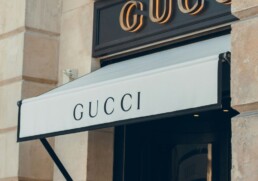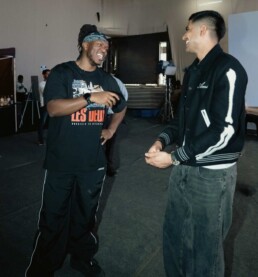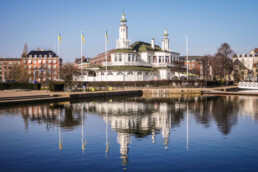Italian brand Takes Home Zalando Visionary Award in Copenhagen
Italian Brand Takes Home Zalando Visionary Award in Copenhagen
🇩🇰 Du finder den danske version af denne artikel her.
The Zalando Visionary Award 2026 was decided on Wednesday during Copenhagen Fashion Week. Finalists were presented earlier in the day, while the winner was revealed later that evening over dinner at the iconic Café Victor in central Copenhagen, a long-standing meeting place where fashion, media and business have traditionally converged.
Launched in 2022, the Zalando Visionary Award aims to support emerging designers who combine innovation with a strong sense of social responsibility.
On the second day of the fashion week, the finalists’ so-called hero pieces were showcased in a curated exhibition, featuring three designs from each brand. The three finalists, INSTITUTION, KYLE HO and Milk of Lime, were selected by the jury for their forward-thinking approach to fashion, clear creative visions and ability to generate social impact through design. The initiative was facilitated by Zalando.
The award ultimately went to INSTITUTION, founded by designer Galib Gassanoff. Based in Italy, the brand draws clear references to Gassanoff’s Azerbaijani heritage and operates at the intersection of fashion, art and social engagement.
"It was his commitment to craftsmanship, shaped by his cultural background, that ultimately set him apart"
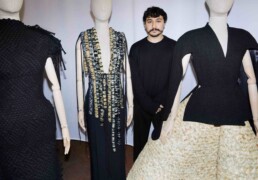
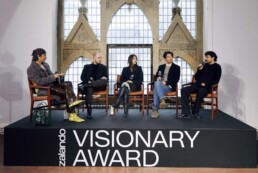
Galib Gassanoff, Founder, INSTITUTION
A significant contribution to Copenhagen Fashion Week
The jury highlighted INSTITUTION’s clear vision and refined craftsmanship. According to the jury, Galib Gassanoff succeeds in translating a globally minded and culturally rooted approach to fashion — one that preserves traditional craft while reinterpreting it in a contemporary context.
As the winner, INSTITUTION will receive mentoring support, a €50,000 prize, as well as €35,000 in production funding from Zalando. In addition, the brand will present its SS27 collection on the catwalk during Copenhagen Fashion Week in August.
Jury member and VP of Brand & Creative at Zalando, Sara Spännar, said:
“Galib has demonstrated a remarkable ability to push the boundaries of creativity, and his dedication to craftsmanship, combined with his cultural background, proved decisive.”
Galib Gassanoff himself emphasised the importance of the community behind the brand:
“I believe in the value of sharing my brand with the world, and I am grateful every time this project is recognised as meaningful.”
The jury consisted of:
Christiane Arp, former Editor-in-Chief of Vogue Germany
Edward Buchanan, Creative Director and Cultural Advocate
Jeanie Annan-Lewin, Contributing Fashion Editor at British Vogue
Sara Spännar, VP of Brand & Creative at Zalando
Sara Sozzani Maino, Creative Director of Fondazione Sozzani
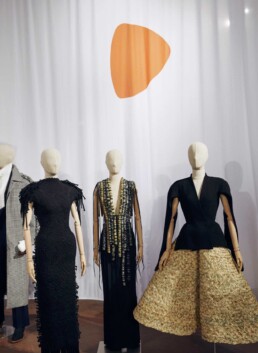
More articles like this?
Stay updated on the most exciting stories, tips, and interviews. Sign up for our newsletter and get it all delivered straight to your inbox. Over 60,500 already on the list. We send it once a week!
Nikolaj Koppel: Podimo has become a catalyst for conversation
Nikolaj Koppel: Podimo has become a catalyst for conversation
🇩🇰 Du finder den danske version af denne artikel her.
Conversation with Nikolaj Koppel, co-founder and content director at Podimo
In 2025, Podimo surpassed one million paying subscribers globally, leaving its start-up days firmly behind. In Denmark, the platform is now both profitable and a prominent voice in public discourse, with podcasts that are listened to, shared, and debated widely.
We spoke with co-founder and content director Nikolaj Koppel about Podimo’s role in Denmark’s media landscape, the growth of podcast advertising, and why communities are becoming an increasingly important part of Podimo’s future strategy.
"Podcast advertising is growing strongly"
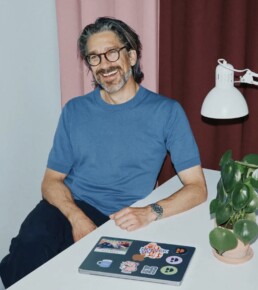
Nikolaj Koppel, co-founder and content director at Podimo
How do you see the opportunities for monetising podcasts, given the frequent talk of a challenging ad market?
“Naturally, there will always be those who struggle to make podcasts profitable. But a glance at Podads shows just how skilled they are at it – which is exactly why we decided to join forces. Looking internationally, and here in Denmark, the podcast advertising market is experiencing strong growth, though some markets are expanding faster than others.
That growth is, of course, of keen interest to us. So far, our focus has been on building a subscription-based business, centred on listeners’ willingness to pay for content. We’ve succeeded in Denmark and three other markets, where the business is already profitable. The plan is for our remaining markets to follow suit in 2026.
At the same time, we see that the broader ecosystem we want to contribute to includes content beyond the paywall. Expanding into this space is therefore a clear strategic move, giving us a larger toolkit to work with.”
"We’re part of shaping the public discourse in Denmark"
Let’s fast-forward to today. How do you see Podimo’s role in Denmark’s media landscape?
“We’ve become what you might call an active catalyst for conversation in Danish society. With the audience volumes and listener numbers we have, Podimo has evolved into a mass medium. We help shape the conversation in Denmark.
Just to give one example: the podcast ‘Barn med den forkerte’, fronted by Kristoffer Eriksen, has just released its second season. It’s one of our most-listened podcasts and a powerful example of how human stories can translate complex systems and welfare processes into narratives that people understand, feel the impact of, and form their own opinions about.
I also believe we play an important role in developing new talent – voices that might not otherwise find their way into traditional media.
And fundamentally, we invest heavily in Danish content, which clearly contributes to a more diverse media landscape.”
You’re constantly expanding with new formats and have massive amounts of data. What are your users asking for?
“We’ve invested a lot of effort into initiatives that take time but pay off in the long run, particularly the smaller communities around and within a podcast.
We can clearly see that when listeners engage in our in-app community – commenting, reacting, asking questions, getting responses from hosts, and getting behind-the-scenes access – it creates greater value. That value builds stronger loyalty to individual podcasts.
Our content experts and hosts also actively use this feedback to improve the shows. And speaking of feedback, we’re seeing growing demand for sports content.
As a result, we’re putting even more time, money, and effort into new sports formats. ‘Stolpe Ind’ with Peter Falktoft and Nicklas Bendtner is a good example, where we bring in external talent, but there’s much more to come this year, including entirely new formats. In recent weeks, we’ve launched ‘Elastico’ with Hav and Cengiz, and ‘Spillertruppen’ with Kasper Steenbach and a string of Danish international players.”
"All of our markets are expected to be profitable during 2026"
And looking beyond Denmark, where does Podimo stand internationally right now?
“As I mentioned, we’ve been profitable in Denmark for several years. It’s a very healthy business, and our investments have certainly paid off. We expect our remaining markets to reach profitability over the course of 2026.
Podcasting is no longer a niche medium, either in Denmark or globally. It has become an integrated part of many people’s daily lives, and it’s only going to grow. We are an active part of that development.”
What makes for a really good working day for you?
“Good colleagues, engaging work, and good coffee.”
More articles like this?
Stay updated on the most exciting stories, tips, and interviews. Sign up for our newsletter and get it all delivered straight to your inbox. Over 60,500 already on the list. We send it once a week!
CIFF and Boozt Look Beyond Fashion Week
CIFF and Boozt Look Beyond Fashion Week
🇩🇰 Du finder den danske version af denne artikel her.
Next week, the 66th edition of Copenhagen International Fashion Fair – better known as CIFF, and often simply referred to as the trade fair during Copenhagen Fashion Week – will take place. This year, CIFF is doing so with Boozt as its official partner. But the ambition goes beyond logos and visibility during fashion week.
According to CIFF CEO Sofie Dolva, the partnership is about creating long-term value for both brands and buyers in an industry undergoing change.
We spoke with Sofie Dolva.
"CIFF is today much more than a trade fair that takes place twice a year."
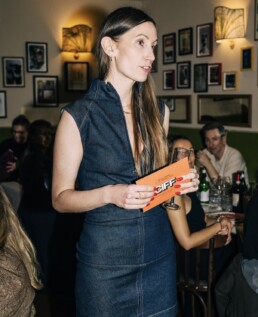
Sofie Dolva, CEO at CIFF
"Boozt bidrager med dyb viden om forbrugeradfærd og markedsudvikling"
Sofie, why are Boozt and CIFF a good match right now?
“Boozt and CIFF are a strong match at this moment because both operate in a changing market, where the fashion industry is looking for longer-term partnerships, deeper insights, and stronger communities. Boozt brings extensive knowledge of consumer behaviour and market developments, while CIFF is a physical platform where relationships, creativity, and business come together. Together, we can create a stronger connection between the digital and the physical, generating more value for both brands and buyers.”
Boozt is a digital platform. What does that mean for a physical trade fair like CIFF?
“The fact that Boozt is a digital platform actually supports and strengthens CIFF’s role. Today, CIFF is much more than a fair that happens twice a year. We are a platform active throughout the year, through content, events, and networks.
The partnership with Boozt allows us to bring in data, insights, and perspectives that can support brands before, during, and after fashion week. It’s not about digital versus physical; it’s about combining the two worlds in a way that makes the fashion industry more knowledge-driven and forward-looking.”
"This year, CIFF will place an even stronger emphasis on curation, quality, and experience."
What would it take for you to consider the partnership with Boozt a success in a year’s time?
“For me, the partnership will be successful if brands and buyers feel that it has created real and measurable value. This could be through new insights, stronger relationships, or better business opportunities. If the partnership also becomes a natural part of CIFF’s platform and continues to have an impact both during fashion week and throughout the rest of the year, I would consider it a success.”
Fashion week is just around the corner. What can we expect from CIFF this year?
“This year, CIFF will place an even stronger emphasis on curation, quality, and experience. A key element is our collaboration with 10 Corso Como, which brings a strong international perspective and a clear connection between fashion, culture, and retail. We are also putting great focus on a series of brand events that allow labels to showcase their DNA and tell their stories in more lively and inspiring settings.
“For visitors, this means a more experience-driven CIFF, where inspiration, storytelling, and relationships are at the centre, and where fashion week extends beyond the traditional trade fair format.”
More articles like this?
Stay updated on the most exciting stories, tips, and interviews. Sign up for our newsletter and get it all delivered straight to your inbox. Over 60,500 already on the list. We send it once a week!
After a record year, Tivoli Copenhagen commits to historic investment levels
After a record year, Tivoli commits to historic investment levels
🇩🇰 Du finder den danske version af denne artikel her.
Tivoli has delivered the strongest financial performance in its history. Following a highly successful Halloween programme and a festive season that saw December become the most profitable month ever recorded, the Copenhagen landmark has upgraded its expectations for 2025.
Visitor numbers reached 4.3 million – the highest level since the pandemic – and revenue is now expected to amount to approximately €181m, with profit before tax forecast at around €21m. This represents a clear upgrade from earlier projections of roughly €178m in revenue and €19.5m in profit, underscoring a year marked by strong demand, disciplined cost control and sustained momentum across seasons.
Tivoli makes historic investments to secure its future
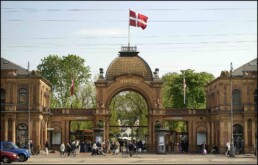
“We expect this fiscal year to close in the black”
Alongside record-breaking financial results, Tivoli has maintained an unprecedented level of investment. In 2025, the park committed nearly €27m to projects including maintenance, building upgrades, the creation of a new themed area in the former Asia zone, and seasonal attractions designed to elevate the visitor experience and strengthen Tivoli’s long-term competitiveness.
Susanne Mørch Koch, Tivoli’s CEO, comments:
“The results for 2025 are very satisfying and reflect strong commercial performance combined with disciplined cost management. What is particularly positive is that we have been able to deliver a solid financial result while maintaining a high level of investment in Tivoli’s development. This provides a robust foundation for the years ahead, where we will continue to invest purposefully in the park’s quality, relevance, and long-term sustainability.”
International visitors remain a key driver of growth. In 2025, 34% of guests came from abroad, with notable increases from the United States and Sweden, while numbers from Norway and Germany saw a slight decline.
Looking ahead to 2026, Tivoli expects an activity level comparable to 2025, with revenue projected at around €188m and profit before tax at approximately €19.5m. As Susanne emphasizes, it is not just about volume: how guests experience Tivoli across seasons, generations, and purposes remains central to the park’s ambitions.
As she has highlighted previously, Tivoli seeks to enhance experiences without over-reliance on screens or gamified “Pokémon-style” solutions, keeping the focus on immersive, authentic engagement. Read here.
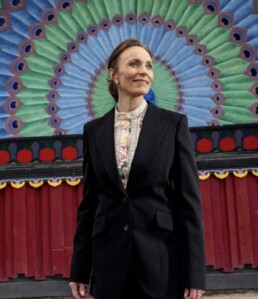
Susanne Mørch Koch, CEO Tivoli
More articles like this?
Stay updated on the most exciting stories, tips, and interviews. Sign up for our newsletter and get it all delivered straight to your inbox. Over 60,500 already on the list. We send it once a week!
A new era for ARKK Copenhagen: Growth & community
A new era for ARKK Copenhagen: Growth, community, and profitability
🇩🇰 Du finder den danske version af denne artikel her.
Last year, we reported that Danish sneaker brand ARKK Copenhagen had secured increased backing from Friheden Invest, giving the company the means to accelerate its ambitions while sharpening its strategic focus.
Since then, the brand has undertaken a series of strategic initiatives. Most recently, ARKK Copenhagen unveiled ARKK Active, a performance-driven collection marking its first step beyond footwear into a broader sportswear offering. The debut collection was developed in collaboration with the popular running club, HAV Runners.
“We are now seeing the payoff from the product and branding investments we made last year”
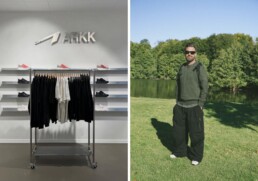
Kasper Høj Rasmussen, CEO & Founder, ARKK Copenhagen
Beyond performance, ARKK Copenhagen has also launched an apparel collection in close collaboration with Zalando. The collection has seen remarkable growth, and the brand is now opening it up to additional retailers.
At the same time, ARKK Copenhagen has relocated its headquarters to centrally located, ground-floor premises in Copenhagen, where it plans to host a series of community events.
The brand has also made several long-term strategic decisions. The flagship store on Strøget has been closed, and write-offs have been undertaken to give the company greater flexibility for proactive investments going forward. This contributed to a net loss of just under DKK 14 million in the last financial year.
Yet according to Kasper Rasmussen, CEO & Founder, the company is already on the right track:
“We expect to end this financial year in the black. It was crucial for us to tidy things up properly. There is real momentum building that we intend to ride.
This also means strengthening our e-commerce team and launching ARKK Lab, which we also operate in Amsterdam and China, with a focus on product development.
The product and branding investments we made last year are finally paying off. More specifically, we are seeing inbound interest far higher than before, and it is clear that all these initiatives are beginning to bear fruit.”
“We expect to close this financial year in the black”
Why was this necessary?
“The store had become something of a ‘ball and chain’ for us since the pandemic. We never really managed to activate it properly, but we are now doing so from our headquarters instead.
We got the first taste of this last weekend, when 250 runners turned up for our ARKK Active launch. One thing was the joy of starting the weekend with so many amazing people, but it also showed us just how much it drives online engagement,” says Kasper Rasmussen.
He also explains that, after ten years, ARKK has relocated its warehouse to a far more flexible setup. While this has incurred some short-term costs, it now gives the brand greater agility, enabling faster responses, more adaptable production, and optimised logistics.
Readers can learn more about ARKK Copenhagen during the upcoming fashion week.
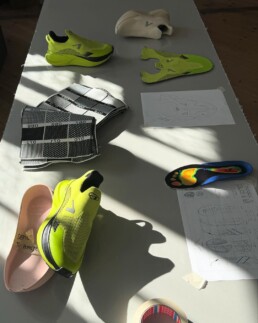
More articles like this?
Stay updated on the most exciting stories, tips, and interviews. Sign up for our newsletter and get it all delivered straight to your inbox. Over 60,500 already on the list. We send it once a week!
Gucci enters a new era with Demna’s first collection
Gucci enters a new era with Demna’s first collection
🇩🇰 Du finder den danske version af denne artikel her.
Last week, fashion house Gucci unveiled its highly anticipated campaign La Famiglia.
A new collection from one of the world’s most historic and influential houses is one thing – but La Famiglia signals the start of a new era for Gucci.
The campaign marks the first time Demna Gvasalia, known simply as Demna, reveals his initial creative vision as the brand’s new Artistic Director.
“They will together lead Gucci into a new era of success”
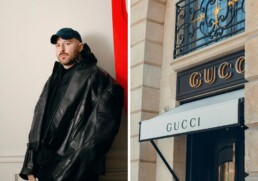
Demna, Gucci
Why this story matters for dontt.dk:
We remain fascinated by the great fashion houses that have shaped trends and influenced culture for decades. It’s about creativity, vision, and ideas that reach beyond the industry – and continue to inspire all of us today.
Demna joined Gucci from Balenciaga in 2025, taking on the role of Artistic Director.
At the time, Stefano Cantino, CEO of Gucci, said:
“I have always admired Demna’s creative approach, which is both unique and powerful. His ability to honor a brand’s iconic heritage while embracing a modern sensibility is extraordinary. With Gucci’s strengthened foundations as a springboard, Demna will guide the house toward renewed fashion authority and enduring cultural relevance.”
Meanwhile, Francesca Bellettini, Deputy CEO of Kering responsible for Brand Development, raised expectations further:
“I look forward to the collaboration between Demna and Stefano as they lead Gucci into a new era of success.”
And that era begins now with La Famiglia.
"Gucci remains one of the most important houses in Kering’s portfolio"
The campaign can be read as an exploration of the house’s archives, visual codes, and historical identities, filtered through Demna’s perspective.
Rather than a single narrative or a definitive collection, Gucci presents a series of characters and wardrobes that together form a portrait of the house.
The photographer is American artist Catherine Opie, whose images depict a collective of personalities, each representing different facets of what Gucci describes as the house’s distinctive “Gucciness.”
There is no central protagonist; instead, it is attitude, gesture, styling, and presence that bind the story together – just as much as the clothing itself. The narrative revolves around identity, belonging, and character, all unified under the concept of La Famiglia.
Family is understood broadly: as a community of differences, tied together by shared references and aesthetic codes. At the same time, La Famiglia should be seen in a wider context. Gucci remains one of the most important houses in Kering’s portfolio, and expectations for Demna are high after a period of both creative and commercial recovery.
The campaign is therefore not a final definition of the future, but a deliberate first step.
The La Famiglia collection will be available in Gucci stores worldwide and on gucci.com from January 8.
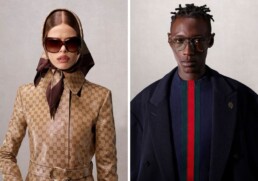
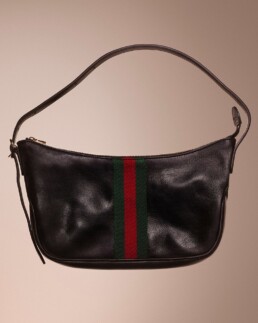
More articles like this?
Stay updated on the most exciting stories, tips, and interviews.
Sign up for our newsletter and get it all delivered straight to your inbox.
Over 60,500 already on the list. We send it once a week!
From Copenhagen to Global Stars’ Instagram Feeds
From Copenhagen to Global Stars’ Instagram Feeds
🇩🇰 Du finder den danske version af denne artikel her.
KSI, Drake and TJ Edwards – what do they have in common?
Over the course of just a few days, the Danish fashion brand Les Deux has appeared on a number of high-profile international figures.
The brand has been widely exposed across Instagram, including on Drake’s account with its 142 million followers, as well as through KSI, Chicago Bears player TJ Edwards and cricketer Shubman Gill.
Gill, in particular, is regarded as one of the most promising young batters in world cricket today, with close to 18 million followers of his own.
The intersection of sport, music and cultural figures wearing Les Deux has long been one of the brand’s key growth drivers. Unlike many fashion brands, however, paid exposure has never been part of its strategy.
According to our information, that remains the case here. The appearances have been entirely organic, with no outreach from the brand itself. No campaign. No sponsorship.
Quantifying the value is difficult, but a single image featuring a Les Deux cap has already attracted more than one million likes, alongside extensive engagement in the comments.
The impact is undeniable when content reaches millions of followers through some of the world’s most recognisable names.
"All exposure has been entirely organic"
One of many developments from Les Deux
This is just one of several developments surrounding Les Deux at the moment, as the brand looks ahead to another year of growth and strong results.
On its home turf, Les Deux recently extended its partnership with F.C. Copenhagen, which faces two major Champions League fixtures this January: a home match against Italian champions Napoli, followed by an away game against the European powerhouse FC Barcelona.
Meanwhile, the brand has signalled further expansion in the UK and opened a new flagship store in Paris, strengthening its presence on international markets. (Read more about the UK here & learn more about Paris here.)
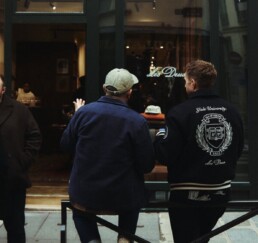
Flere artikler som denne?
Hold dig opdateret på de mest spændende historier, tips og interviews.
Tilmeld dig vores nyhedsbrev og få det hele direkte i inboxen.
Allerede 60.000+ på listen. Vi sender ud 1 gang om ugen!
Copenhagen Iconic Venue and Danish Startup Reinvent the Cloakroom
Copenhagen Iconic Venue and Danish Startup Reinvent the Cloakroom
🇩🇰 Du finder den danske version af denne artikel her.
One is one of Copenhagen’s most iconic nightlife venues. The other is an ambitious Danish tech company, focused on solving a problem that has existed for decades.
Søpavillonen has partnered with Keypitt™ to digitize its cloakroom, replacing the traditional paper ticket with a personal, digital KeyPass. Guests set it up once and can store it in their digital wallet—no app required.
While the cloakroom might seem like a small detail, it is here that the pace truly picks up. According to Søpavillonen, the move isn’t about technology for technology’s sake—it’s about flow, safety, and creating a better working environment.
"We’ve spent more than 300 hours testing and developing the system alongside industry professionals”
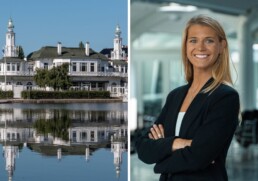
Co-founder Karla Pitt Winther, Keypitt™
The cloakroom is a key touchpoint for our guests
Jon Vanggaard Thomsen, owner and partner at Søpavillonen, explains:
“The cloakroom is a key touchpoint for our guests, especially on busy nights. With Keypitt™, we can reduce queues, improve safety, and offer a better experience for both guests and staff. It’s a simple, yet significant upgrade to a long-standing function.”
Keypitt™, the provider behind the system, is a Danish tech company that develops digital cloakroom solutions for nightlife venues, concert halls, conference centres, and arenas.
Tests from other venues suggest that throughput can be increased significantly, while the number of lost items is reduced. If something is left behind, the owner can be easily contacted via the phone number linked to their digital KeyPass.
Earlier this year, the company also managed the cloakroom at TECHBBQ, serving over 10,000 guests.
Co-founder Karla Pitt Winther adds:
“The cloakroom has remained virtually unchanged for over a century. We’ve spent more than 300 hours testing and developing the system alongside industry professionals to create a solution that truly improves flow and adds value for guests, staff, and venues alike.”
She continues that the implementation at Søpavillonen is part of a broader trend, where cultural and nightlife venues are increasingly digitizing operational functions—not to change the atmosphere, but to remove the small friction points that can otherwise weigh heavily on the experience.
More articles like this?
Stay in the loop with the most exciting stories, tips, and interviews.
Sign up for our newsletter and have it delivered straight to your inbox.
Join over 60,000 subscribers. We send updates just once a week!
Bjarke Just Nielsen is reshaping Copenhagen’s restaurant scene
Bjarke Just Nielsen is reshaping Copenhagen’s restaurant scene
🇩🇰 Du finder den danske version af denne artikel her.
A conversation with Bjarke Just Nielsen
To many, his trajectory might read like the result of a long career. In reality, most of it has been built in just five or six years. Today, Bjarke Just Nielsen stands behind 17 restaurants, several cafés and bakeries across Copenhagen, three IT platforms, and a production facility.
Educated at Copenhagen Business School, Nielsen brings a more academic background than most restaurateurs. His story has been told before, but it is precisely this unconventional route into the industry that makes it interesting.
Which ideas and tools did he carry with him, and how have they helped shape a company that has grown rapidly, deliberately, and with data as a central driving force?
"I have never been afraid of failure if I could see that I had done my best"
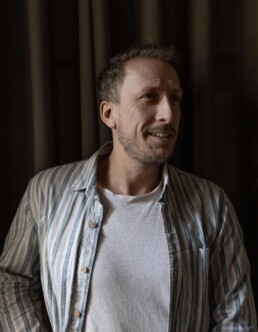
Bjarke Just Nielsen
Facts about the Norrlyst Group
The Norrlyst Group has grown from one to 17 restaurants in just six years. In June 2025, the group and Restaurant Udtryk earned their first Michelin star only 41 days after opening. Most recently, Norrlyst opened Lille Mølle.
Beyond its restaurants, the group also operates three IT platforms and a production facility.
Bjarke, if we rewind the clock, was it written in the stars that you would one day build your own company?
“It’s always interesting to look back. I never had a master plan. My first proper job was at Færgekroen in Tivoli when I was 14 or 15, and at the time I was simply happy to have work at all. I’d sent out countless applications.
That’s where I first caught the service bug. It led me to study Business Administration with a focus on Service Economics, followed by a master’s degree in Supply Chain Management. In many ways, that academic path is also what landed me, straight after my studies, in a suit and tie.”
After CBS, Bjarke joined Novo Nordisk’s Talent Track and was subsequently accepted into Ørsted’s graduate program, a highly selective process with over 8,000 applicants and only about 20 making it through.
Bjarke also reflects that rather than constantly switching jobs because he felt they weren’t the right fit, he had to look inward and realize that it was more likely him who didn’t fit the companies, rather than the other way around.
Bjarke continues:
“I’ve never been afraid of failure, as long as I knew I had given my best. I love creating and making things succeed, and many of my victories in life have been pure work victories. I’m rarely the most talented person in the room from the start, but I often manage to come out ahead. That’s why I think it was always in the cards for me to become an entrepreneur.
I have a strong work ethic, a high tolerance for risk, and I feel lucky to be able to manage my own schedule. It has been an enormous privilege, especially after starting my own family. I love being able to drop the kids off at nine and pick them up again at three. So maybe the answer to your question is a resounding yes.”
"To be honest, there was no grand plan from the start"

The Norrlyst Group has just turned five. How do you remember the early days, and what was the plan?
“To be honest, there wasn’t a grand plan. I had simply decided that I no longer wanted to sit in a suit. We started without spreadsheets or elaborate concepts. It’s actually quite the opposite of how we run the business today. And yet, somehow it worked.
We quickly learned to listen to our customers, take notes, and put our ideas into a system. Looking back, that was when we first started working with data, which today forms the foundation of the group.”
“My first head chef was Thilde Gilling, known in the industry as the Smørrebrød Queen, so we started with smørrebrød. Later, Emil Eshardt-Nielsen joined the team. He had experience from Søllerød Kro, Restaurant AOC, and Winterspring, and he helped shape much of the direction we follow today. Emil remains one of my closest collaborators and now serves as CPO.”
“And how do I remember that time? It moved fast. I was a builder, waiter, restaurant manager, and problem solver all at once. If we got feedback on poor acoustics on a Monday, we’d install a new acoustic ceiling by Tuesday. If a toilet was blocked, I fixed it. Work has never intimidated me, and I’ve always known that you don’t need a perfect plan from the start to reach your goal.”
“Corona hit shortly after we opened, so in a way, we were almost born as an agile company, constantly having to adapt to the situation at hand.”
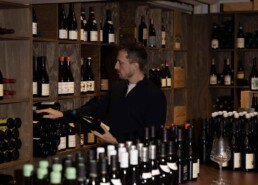
Data is key: "Trust the algorithm"
Speaking of data, FreeTable is a chapter of its own. What inspired you to create it, and how does it connect to Norrlyst?
“The core idea behind FreeTable was to revolutionize how people book tables at restaurants, just as we’ve seen happen in many other sectors of the experience economy. At the same time, the project builds on our understanding and collection of data.”
“We wanted to bring the entire restaurant industry along, make it more automated, and create a win-win for both restaurants and guests. Anyone can use the platform. It’s an additional booking system, but the real goal is the product itself—our own algorithm, which has cost millions to develop.”
“It’s a formula that can change the way we think about dining out, both for guests and restaurateurs. It’s about being present, being your own best friend, and trusting the algorithm.”
“It has already given us a stable baseline, with our restaurants running safely at 10–12 percent EBITDA. Some might call it boring, but predictability and stability are exactly what the industry needs. Hotels and airlines are far ahead of us with dynamic pricing, and I see that as a huge opportunity for the restaurant world. Price optimization can mean many things, from menus to bookings, and we believe this is the path the industry should take.”
In the new year, you can read an article on FreeTable and its ambitions on dontt.dk, where Bjarke offers a unique insight into a massive dataset.
"I still love my work and look forward to every day I go into the office"
How does your typical day look today?
“I still love my work and look forward to every day at the office. But family is, of course, important, with two young children at home. I make it a priority to drop off and pick up my kids, and I’ve moved into a more strategic role within the group, which gives me that freedom.
I’m no longer involved in day-to-day operations, so I can think further ahead and focus on development. Some of my closest friends are also part of the company, so work and social life often blend together.”
What drives you personally?
“I’m driven by the passion to see how far we can take this. It’s still exciting to challenge the IT side, look at acquisitions, and explore new directions.
I work with many small milestones. It could be a Michelin star, employee satisfaction, or new concepts. That’s what motivates me. The most important thing is that we give our best and don’t stagnate in our development.”
Claus Meyer has been a huge inspiration
Who inspires you?
“I’ve never been the type to have lots of idols or people I follow religiously. But Claus Meyer has been a huge inspiration. He has left a clear mark on the industry and changed things ahead of his time.
We still celebrate many of the initiatives he set in motion. I’ve read his biography, which says something, because I rarely read books. I much prefer listening.
In general, I’m very focused and keep my nose in my own business. I’m not someone who is constantly updated on media or trends. I put my energy into our own journey.”
How do you see Norrlyst in five years?
“We approach strategy very differently today, so of course there are many plans. But I still don’t think you can plan that far ahead. The last five years have shown that anything can happen.
That’s why we build the company to be able to adapt quickly. As you reach a certain size, decisions take longer, but flexibility remains a key principle. We need to be ready for the unpredictable while holding on to the stable foundation we’ve built.”
More articles like this?
Stay in the loop with the most exciting stories, tips, and interviews.
Sign up for our newsletter and have it delivered straight to your inbox.
Join over 60,000 subscribers. We send updates just once a week!
Billi Bi recruits global ECCO executive
Billi Bi recruits global ECCO executive
🇩🇰 Du finder den danske version af denne artikel her.
Next year, Danish footwear brand Billi Bi will celebrate its 90th anniversary, if one counts the founding of its parent company, Fransi, in 1936 by the grandparents of current owner Carsten Friis. Billi Bi itself was launched in 1993, carrying forward a legacy of craftsmanship and design.
The name, delightfully, comes from Friis’ favourite dish: the French mussel soup Billi Bi, first served at the legendary Parisian restaurant Maxim’s in the 1930s, a story as charming as it is tangential to the shoes themselves.
“Billi Bi is built on a solid foundation”
Despite its long history, Billi Bi shows no signs of slowing down. With ambitions to expand its presence on the international stage, the company is strengthening its leadership team.
Justin Daughrity-Winther joins the brand in a newly created role as Chief Commercial Officer (CCO), taking responsibility for refining Billi Bi’s commercial strategy and ensuring a seamless dialogue between brand identity, collections, and distribution. Daughrity-Winther brings over a decade of international experience in footwear, most recently serving as Global Vice President of Brand at ECCO.
“Billi Bi is built on a strong foundation and already experiencing healthy growth,” says Carsten Friis, CEO and owner. “Bringing Justin on board allows us to further accelerate this development, both across the Nordics and internationally. His strategic vision and commercial expertise align perfectly with the direction we want to take the brand.”
With this appointment, Billi Bi signals its intent to marry its rich heritage with a forward-looking strategy, embracing new markets and audiences while staying true to the craftsmanship and quality that have defined the brand for nearly three decades.
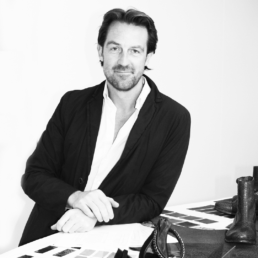
Carsten Friis, CEO and owner
Flere artikler som denne?
Hold dig opdateret på de mest spændende historier, tips og interviews.
Tilmeld dig vores nyhedsbrev og få det hele direkte i inboxen.
Allerede 55.500+ på listen. Vi sender ud 1 gang om ugen!




